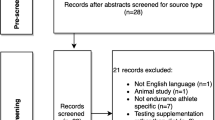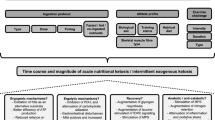Abstract
Purpose of Review
To review the available literature/evidence on low carbohydrate/high fat (LCHF) and low carbohydrate ketogenic (LCKD) diets’ effects on human athletic performance and to provide a brief review of the physiology and history of energy systems of exercise.
Recent Findings
Multiple studies have been conducted in an attempt to answer this question, many within the last 3–5 years. Studies are heterogenous in design, intervention, and outcome measures.
Summary
Current available data show that LCHF and LCKD do not significantly enhance or impair performance in endurance or strength activities. However, there is a trend towards improved body composition (greater percent lean body mass) across multiple studies. While this may not translate to enhanced performance in the primarily laboratory conditions in the reviewed studies, there could be a benefit in sports in which an athlete’s strength-to-weight ratio is a significant determinant of outcome.
Similar content being viewed by others
References
Papers of particular interest, published recently, have been highlighted as: • Of importance
Gordon ES, Goldberg M, Chosy GJ. A New Concept in the Treatment of Obesity: A 48-hour total fast followed by six meals a day and later by stepwise increases in food and calorie intake has permitted patients to lose weight that they show no tendency to regain for periods of up to 6 months. It also promoted spontaneous evolution of good dietary habits. JAMA. 1963;186:50–60.
Atkins RC, Gare F, Mandell FG, Monica H. Dr Atkins' Diet Revolution. Bantam. 1972.
Burke LM, Kiens B. “Fat adaptation” for athletic performance: the nail in the coffin? J Appl Physiol. 2006;100:7–8.
Wilder RM, Boothby WM, Beeler C. STUDIES OF THE METABOLISM OF DIABETES. J Biol Chem. 1922;51:311–57.
Guelpa G. La lutte contre l'epiepsie par la desintoxication et par la reeducation alimentaire. Rev Ther Med Chir. 1911;78:8.
August Krogh JL. The Relative Value of Fat and Carbohydrate as Sources of Muscular Energy: With Appendices on the Correlation between Standard Metabolism and the Respiratory Quotient during Rest and Work. Biochem J. 1920;14:290–363.
LEVINE SA, GORDON B, DERICK CL. SOME CHANGES IN THE CHEMICAL CONSTITUENTS OF THE BLOOD FOLLOWING A MARATHON RACE: WITH SPECIAL REFERENCE TO THE DEVELOPMENT OF HYPOGLYCEMIA. JAMA. 1924;82:1778–9.
Krebs HA, Johnson WA. Metabolism of ketonic acids in animal tissues. Biochem J. 1937;31:645–60.
Advances in Enzymology and Related Areas of Molecular Biology.
Bergström J, Hermansen L, Hultman E, Saltin B. Diet, muscle glycogen and physical performance. Acta Physiol Scand. 1967;71:140–50.
Maughan RJ, Poole DC. The effects of a glycogen-loading regimen on the capacity to perform anaerobic exercise. Eur J Appl Physiol Occup Physiol. 1981;46:211–9.
Bogardus C, LaGrange BM, Horton ES, Sims EA. Comparison of carbohydrate-containing and carbohydrate-restricted hypocaloric diets in the treatment of obesity. Endurance and metabolic fuel homeostasis during strenuous exercise. J Clin Invest. 1981;68:399–404.
Maunder E, Kilding AE, Plews DJ. Substrate Metabolism During Ironman Triathlon: Different Horses on the Same Courses. Sports Med. 2018;48:2219–26.
Holloszy JO, Coyle EF. Adaptations of skeletal muscle to endurance exercise and their metabolic consequences. J Appl Physiol Respir Environ Exerc Physiol. 1984;56:831–8.
Henriksson J, Reitman JS. Time course of changes in human skeletal muscle succinate dehydrogenase and cytochrome oxidase activities and maximal oxygen uptake with physical activity and inactivity. Acta Physiol Scand. 1977;99:91–7.
• Phinney SD, Horton ES, Sims EA, Hanson JS, Danforth EJ, LaGrange BM. Capacity for moderate exercise in obese subjects after adaptation to a hypocaloric, ketogenic diet. J Clin Invest. 1980;66:1152–61 Rigorous and well-designed original/proof of concept experiment in human subjects.
Symons JD, Jacobs I. High-intensity exercise performance is not impaired by low intramuscular glycogen. Med Sci Sports Exerc. 1989;21:550–7.
Grisdale RK, Jacobs I, Cafarelli E. Relative effects of glycogen depletion and previous exercise on muscle force and endurance capacity. J Appl Physiol. 1990;69:1276–82.
Brooks GA, Mercier J. Balance of carbohydrate and lipid utilization during exercise: the “crossover” concept. J Appl Physiol. 1994;76:2253–61.
• Burke LM. Re-Examining High-Fat Diets for Sports Performance: Did We Call the “Nail in the Coffin” Too Soon? Sports Med. 2015;45(Suppl 1):S33–49 Thorough review of available literature on this topic to date (through 2015) with careful discussion of mechanisms and shortcomings of previous studies.
Greene DA, Varley BJ, Hartwig TB, Chapman P, Rigney M. A Low-Carbohydrate Ketogenic Diet Reduces Body Mass Without Compromising Performance in Powerlifting and Olympic Weightlifting Athletes. J Strength Cond Res. 2018;32:3373–82.
Waldman HS, Krings BM, Basham SA, Smith JEW, Fountain BJ, McAllister MJ. Effects of a 15-Day Low Carbohydrate, High-Fat Diet in Resistance-Trained Men. J Strength Cond Res. 2018;32:3103–11.
McSwiney FT, Wardrop B, Hyde PN, Lafountain RA, Volek JS, Doyle L. Keto-adaptation enhances exercise performance and body composition responses to training in endurance athletes. Metabolism. 2018;81:25–34.
Heatherly AJ, Killen LG, Smith AF, Waldman HS, Seltmann CL, Hollingsworth A, et al. Effects of Ad libitum Low-Carbohydrate High-Fat Dieting in Middle-Age Male Runners. Med Sci Sports Exerc. 2018;50:570–9.
Kephart WC, Pledge CD, Roberson PA, et al. The Three-Month Effects of a Ketogenic Diet on Body Composition, Blood Parameters, and Performance Metrics in CrossFit Trainees: A Pilot Study. Sports (Basel). 2018. https://doi.org/10.3390/sports6010001.
• Burke LM, Ross ML, Garvican-Lewis LA, et al. Low carbohydrate, high fat diet impairs exercise economy and negates the performance benefit from intensified training in elite race walkers. J Physiol. 2017;595:2785–807 Most recent & one of the largest studies to date performed in human subjects. Rigorous control of diet and careful monitoring of both laboratory and “real world” outcomes.
Wilson JM, Lowery RP, Roberts MD, Sharp MH, Joy JM, Shields KA, et al. The Effects of Ketogenic Dieting on Body Composition, Strength, Power, and Hormonal Profiles in Resistance Training Males. J Strength Cond Res Publish Ahead of Print. 2017;1.
Zinn C, Wood M, Williden M, Chatterton S, Maunder E. Ketogenic diet benefits body composition and well-being but not performance in a pilot case study of New Zealand endurance athletes. J Int Soc Sports Nutr. 2017;14:22.
Zajac A, Poprzecki S, Maszczyk A, Czuba M, Michalczyk M, Zydek G. The effects of a ketogenic diet on exercise metabolism and physical performance in off-road cyclists. Nutrients. 2014;6:2493–508.
Paoli A, Bianco A, Grimaldi KA. The Ketogenic Diet and Sport: A Possible Marriage? Exerc Sport Sci Rev. 2015;43:153–62.
Vogt M, Puntschart A, Howald H, Mueller B, Mannhart C, Gfeller-Tuescher L, et al. Effects of dietary fat on muscle substrates, metabolism, and performance in athletes. Med Sci Sports Exerc. 2003;35:952–60.
Rowlands DS, and WHM-C, 2002 Effects of high-fat and high-carbohydrate diets on metabolism and performance in cycling. metabolismjournal.com
Goedecke JH, Christie C, Wilson G, Dennis SC, Noakes TD, Hopkins WG, et al. Metabolic adaptations to a high-fat diet in endurance cyclists. Metabolism. 1999;48:1509–17.
Lambert EV, Speechly DP, Dennis SC, Noakes TD. Enhanced endurance in trained cyclists during moderate intensity exercise following 2 weeks adaptation to a high fat diet. Eur J Appl Physiol Occup Physiol. 1994;69:287–93.
O'Keeffe KA, Keith RE, Wilson GD, Blessing DL. Dietary carbohydrate intake and endurance exercise performance of trained female cyclists. Nutrition Research. 1989;9:819–30.
Phinney SD, Bistrian BR, Evans WJ, Gervino E, Blackburn GL. The human metabolic response to chronic ketosis without caloric restriction: preservation of submaximal exercise capability with reduced carbohydrate oxidation. Metabolism. 1983;32:769–76.
Paoli A, Grimaldi K, D'Agostino D, Cenci L, Moro T, Bianco A, et al. Ketogenic diet does not affect strength performance in elite artistic gymnasts. J Int Soc Sports Nutr. 2012;9:34.
Author information
Authors and Affiliations
Corresponding author
Ethics declarations
Conflict of Interest
Matthew B. Kaspar, Kerstin Austin, Martin Huecker, and Menaka Sarav declare they have no conflict of interest.
Human and Animal Rights and Informed Consent
This article does not contain any studies with human or animal subjects performed by any of the authors.
Additional information
Publisher’s Note
Springer Nature remains neutral with regard to jurisdictional claims in published maps and institutional affiliations.
This article is part of the Topical Collection on Gastroenterology, Critical Care, and Lifestyle Medicine
Rights and permissions
About this article
Cite this article
Kaspar, M.B., Austin, K., Huecker, M. et al. Ketogenic Diet: from the Historical Records to Use in Elite Athletes. Curr Nutr Rep 8, 340–346 (2019). https://doi.org/10.1007/s13668-019-00294-0
Published:
Issue Date:
DOI: https://doi.org/10.1007/s13668-019-00294-0




